The Bruins lineup was loaded with star players, such as Hall of Famers Dit Clapper, Cooney Weiland, Mickey MacKay, Marty Barry, goaltender Tiny Thompson and the legendary Eddie Shore as well as Lionel Hitchman.
The Maroons were no pushovers either, as their roster also featured Hall of Famers goalie Clint Benedict, Georges Boucher, Red Dutton, Nels Stewart, Hooley Smith and Babe Siebert for no less than 12 future Hall of Famers taking part.
While the host Maroons entered the game at 2-2, Montreal would go on to win the Canadian Division of the NHL with a 2316-5 record for 51 points (out of a then possible 88 from the current 44 game schedule), second best in the league and behind only the Bruins, who would win the American Division with a league best 77 points from a stellar 38-5-1 record.
The Maroons would draw first blood when Dave Trottier beat Thompson from Bill Phillips at the 9:30 mark of the first period. Weiland responded for Boston with just ten seconds remaining in the first with an assist from Shore as the period ended in a 1-1 tie.
Montreal retook the lead at the 4:30 mark of the second period when Smith scored from Stewart to put the Maroons back up 2-1.
Shore then got into a fight with the rugged Boucher of the Maroons, who finished his long NHL career with 838 penalty minutes in 449 games.
At the conclusion of the fight, the violent tone for the rest of the evening was fully established when Shore spotted Trottier as the nearest Maroon, and got into it with him so viciously that Shore collapsed one of Trottier's lungs and sent him to the hospital.
Shore was now a marked man, as for the rest of the night the Maroons sought out Shore for revenge. Smith, who had fought Shore on many occasions was the first to confront the hated Bruin for Shore's third fight of the evening, leaving him looking somewhat battered.
In between all the fisticuffs, there was still some hockey to be played, and Boston scored twice in 50 seconds just after the midway point of the second period, as Bill Carson tied the game at 10:30 from Art Gagne followed by Weiland's second goal of the game at 11:20 from no less than Shore to give Boston a 3-2 lead.
Clapper then scored his fifth goal of the young season with 1:30 left in the second period from Dutch Gainor to extend the Bruins advantage to 4-2 after the second period.
Stewart pulled Montreal to within one at the 3 minute mark with an assist from Boucher to make the score 4-3, but the Maroons were still furious with Shore, and continued to pound him at every opportunity, but he was no stranger to that kind of treatment and continued to press on despite his ever increasing ragged appearance.
Dutton was the next Maroon to attempt to knock Shore out of the game, as the previous season's penalty minute leader exchanged blows with Shore in his fourth fight of the game. Similar to Boucher, Dutton would complete his NHL career with 871 penalty minutes in 449 games played.
The final bout on Shore's fight card came after Siebert was knocked down behind the net. He was in the process of rising to his skates when Shore slugged the vulnerable Maroon. Enraged, Siebert charged at Shore with his stick raised and cross checked him in the head, setting off Shore's fifth brawl of the game. The two went at it so violently, that when the battle was over, beleaguered referees George Mallinson and Lou Hefferman called a halt to the game while the blood was cleaned off the ice.
The game ended without any further scoring for a 4-3 win for the Bruins and an NHL record five fights for the hated Shore, a record which still stands to this day and will remain unbroken, as the rules now call for a game misconduct for any player accumulating three fights in a game.
Speaking to the toughness of the combatants, that night, Shore of Boston and Dutton, Siebert and Smith would all finish in the top ten in league penalty minutes for the season.
In addition to Trottier, Siebert suffered so much at the hands of Shore that he also was hospitalized that night while Shore finished the night with a trip to the hospital were he was diagnosed with a broken nose, two black eyes, a gashed cheekbone, cuts over both eyes, a mild concussion and four missing teeth!
Shore missed the Bruins next game, perhaps fortunately, as it was rematch against the very same Maroons in Boston just three days later, but returned to the ice for Boston's next game one week after the bloodbath, scoring a goal against the Pittsburgh Pirates.
Bruins owner Charles Adams was incensed and protested the actions of the Maroons, complaining to NHL president Frank Calder that "the hockey displayed by the Maroons was a crime. It was brutal. Eddie Shore was knocked out four times." When Calder did nothing in response, Adams caused quite a stir at the league offices when he presented Shore with a check for $500 before the Bruins next home game on December 3rd, explaining that the reward represented $100 for each scar Shore received against the Maroons and the "game way he took his punishment". Shore, though, insisted that the money be shared equally with the rest of his teammates.
The two teams would meet again that season in the playoffs, as the second and third place teams from each division would face off in the Quarterfinals, with the winners advancing to the Semifinals against each other for a spot in the Stanley Cup Finals. Meanwhile, as division winners the Bruins and Maroons advanced directly to the Semifinals for a place in the finals. Boston took Game 1 in overtime 2-1 and won Game 2 by a score of 4-2 on the road. Montreal stayed alive with a tight 1-0 win in Boston, but the Bruins closed out the Maroons with a 5-1 win in Game 4. Boston then lost in the best-of-three final to the Montreal Canadiens in two straight.
Today's featured jersey is a 1929-30 Boston Bruins Eddie Shore jersey as worn the night Shore set a record for Most Fights in a Single Game with five.
The Bruins were formed in 1924 and originally wore brown and gold uniforms, which were taken from owner Adams' First National Stores. After changing to a new style for their second season, today's featured jersey style arrived for their third season of 1926-27 and was worn for six seasons, which included their first Stanley Cup in 1929.
Sharp eyed readers will notice a Boston Cubs patch on the left sleeve, as this particular sweater was worn by Shore for two seasons until being handed down to the Bruins minor league team, the Cubs and worn by player Byron Johnson, whose family retained possession of the jersey until recently, when it was auctioned off for $119,500.
Today's video is a 15 minute film on the career of Shore, a rich topic worthy of much more than we can provide here.

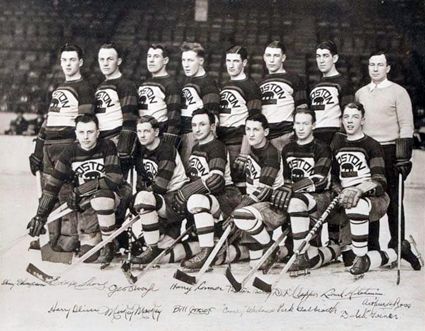
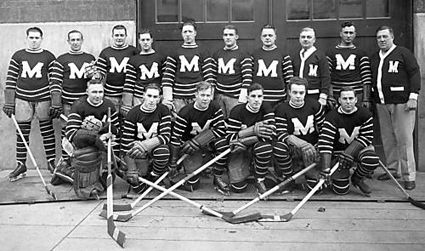
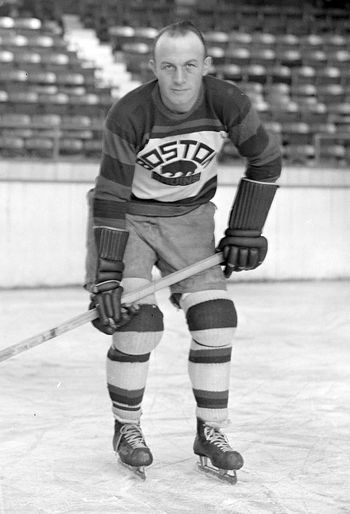
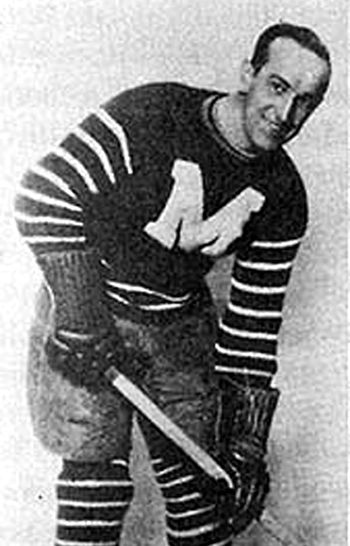
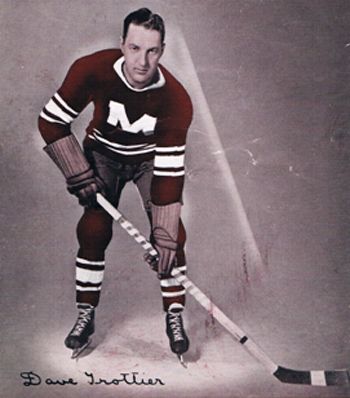
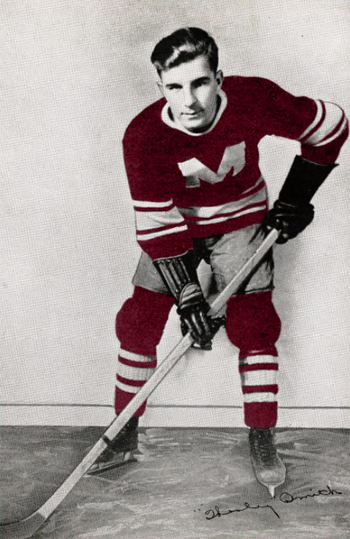
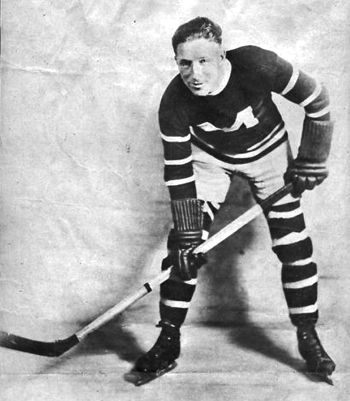
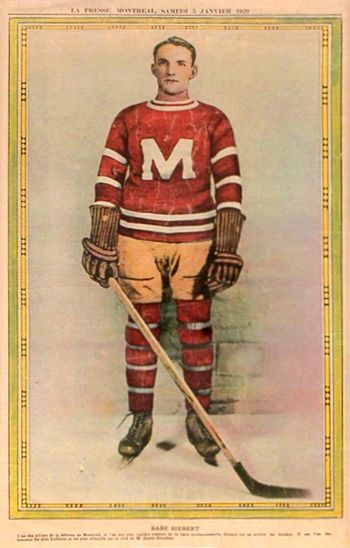

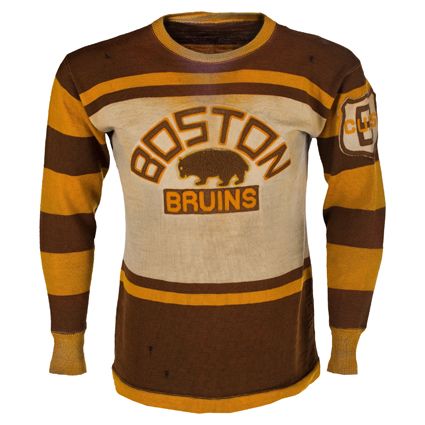
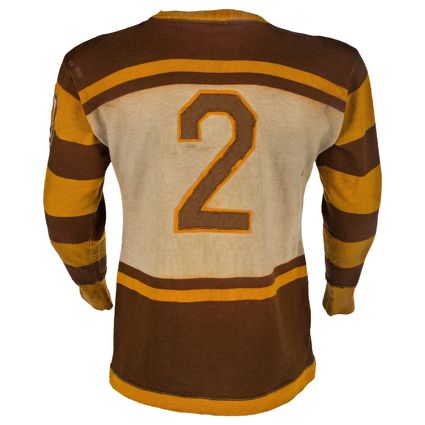










No comments:
Post a Comment
We welcome and encourage genuine comments and corrections from our readers. Please no spam. It will not be approved and never seen.